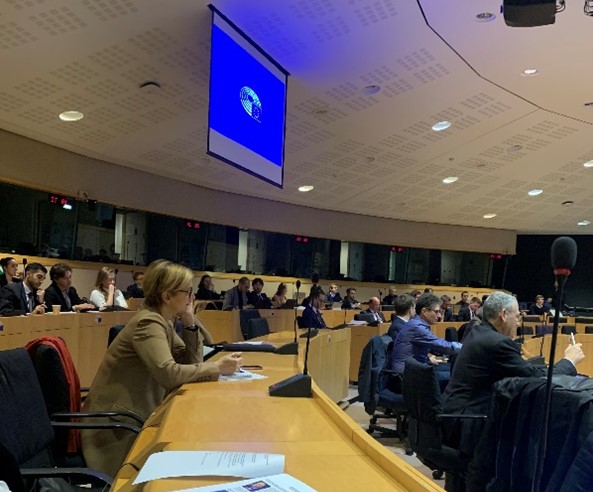European Sustainability Reporting Standards: obstacle or booster to filling the green investment gap? Feeding into European investors’ decisions to finance the green transition
On Monday 7th of November, at the European Parliament, the Sustainable, Long-term investments & Competitive European Industry Intergroup held its conference on “European Sustainability Reporting Standards: obstacle or booster to filling the green investment gap?”
Chaired by MEP and Co-Chair Dominique Riquet and overseen by Alexandra Jour-Schroeder, Deputy Director-General of DG FISMA, European Commission, the event focused on how the sustainability standards are fit for channeling investments towards the green transition.

- MEP and Co-Chair Dominique Riquet opened the conference by underlining the importance of the work on better financing towards the transition. He reminded the recent work of the European parliament on the corporate sustainable reporting directive (CSRD) and the role of EFRAG on setting up the reporting obligations.
- Keynote speaker, Alexandra Jour-Schroeder, Deputy Director-General of DG FISMA, European Commission mentioned the number of action plan and strategies the European Commission took on the sustainable finance area. She emphasized on the importance of the sustainable finance disclosure regulation (SFDR) as an instrument for both market participants and financial advisors, and the double materiality being its counter stone. Concerning the corporate sustainable reporting directive (CSRD), Alexandra Jour-Schroeder highlighted that the directive provide clarity in a systematic and comparable manner and listed several features that makes it a successful tool: it covers a wide range of companies, gives an audit of assurance requirements, it is a tool to foster digitalization, requirement for companies to report with the European sustainability reporting standard (ESRS)… She mentioned the center role of EFRAG and stressed out the need to find balance for the ESRS between, on the one hand, useful information and on the other hand be mindful of the possible cost. She pointed out that developing European reporting standards is an ambitious task and emphasized on the usability of these standards.
The panel discussions were moderated by Jurei Yada, Program Leader for EU Sustainable Finance at E3G.

- Thomas Dodd, Policy officer on sustainability reporting, DG FISMA, European Commission underlined the flexibility of the standard, saying that the EFRAG standards are evolutive and then will continue to evolve. He added that the first set of standards would be, hopefully, adopted by the European Commission by June 2023.
- Patrick de Cambourg, President of the Autorité des normes comptables and Chair of the Project Task Force on European Sustainability Reporting Standards at EFRAG highlighted that sustainability reporting is a changing step, a tool for the management of companies. Cross cutting standards are going to be implemented on governance, strategy, business model, risk management and impact. A goal according to Patrick de Cambourg is to avoid multiple reporting and therefore to reach a compromise and interoperability among all the stakeholders and between the different international initiatives.
- Alexandra Palinska, Executive director of Eurosif reckoned the need for alignment with international standards. She acknowledged the challenge that poses these standards for companies. Eurosif as been concerned with eventual push-back on the social and governance aspect of the standard. Alexandra Palinska highlighted also the importance of information access and the mandatory aspect of the ESG disclosure for all member states.
- Héléna Charrier, Director SRI at La Banque Postale Asset Management alerted on the precision of the standards, quality is ensured by being very specific in the definitions used for the indicators, as investors waste a lot of time understanding the intention behind the methodological choices.
- Pascal Durand, MEP and Rapporteur on the Corporate Sustainable Reporting Directive, during his closing remarks insisted on the quality and relevance of the standards developed by EFRAG. Members of EFRAG will have to ensure that the generic standards and future sectoral standards respect the mandate of the directive. The MEP also reminded that setting ambitious standards is for the EU an issue of influence. Pascal Durand concluded saying that the CSRD is a major step forward creating legally binding and transparent standards on environmental, social, human rights and governance issues.

Contact:
Garance Galliaerde, secretariat@investmentindustryintergroup.eu
